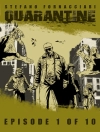The stories in this collection are rich, tangled, and suffused with mystery and wonder. In the narrowing, winding city streets, strange figures roam. Great flocks of birds soar over rooftops, obscuring the sun. Cockroaches appear through cracks and scuttle across floorboards. Individuals careen from university buildings to dimly lit parlour rooms, through strange shops and endless storms.Crowded with moments of stunning beauty, the stories in this collection showcase Schulz’s darkly modern sensibility, and his status as one of the great transformers of the ordinary into the fantastical.
लेखक के बारे में
Stanley Bill is Associate Professor of Polish Studies and Director of Slavonic Studies at the University of Cambridge. He has translated works by Jacek Dukaj and Czesław Miłosz’s unfinished novel The Mountains of Parnassus. He is founder and editor-at-large of the news and opinion website Notes from Poland.












